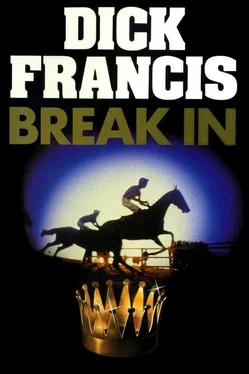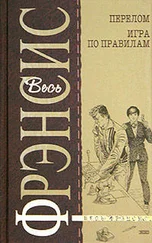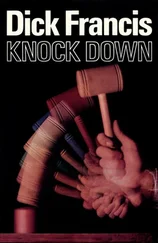I dreamed of being run over by a tractor and felt like it a bit when I woke up. The morning after falls like the day before’s were always a bore.
It was nearly nine when I made it to the kitchen, but although the lights were on against the grey morning, there was no one else there. I heated myself some coffee and began to read Bobby’s daily paper, which was the Towncrier , not the Flag .
On page seven, which was wholly devoted to the Wednesday comments and opinions of a leading and immensely influential lady columnist, the central headline read:
WHAT PRICE FATHERLY LOVE?
And underneath, in a long spread unmissable by any Towncrier reader, came an outline of Maynard Allardeck’s upwardly thrusting career.
He had journeyed from commodity broker, she said, to multi-storey magnate, sucking in other people’s enterprises and spitting out the husks.
His modus operandi , she explained, was to advance smilingly towards an over-extended business with offers of loans of life-saving cash. Easy terms, pay when you can, glad to help. His new partners, the journalist said, welcomed him with open arms and spoke enthusiastically of their benefactor. But oh, the disillusionment! Once the business was running smoothly, Maynard would very pleasantly ask for his money back. Consternation! Disaster! Impossible to pay him without selling up and closing. The workforce redundant. Personal tragedies abounding. Can’t have that, Maynard agreed genially. He would take the business instead of the money, how was that? Everyone still had their job. Except, hard luck, the proprietor and the managing director. Maynard presently would sell his now financially stable newly acquired business at a comfortable profit to any big fish looking out for manageable minnows: and so back, one might say, to the start, with Maynard appreciably richer.
How do I know all this? the lady journalist asked; and answered herself; less than three weeks ago on the TV programme How’s Trade , Maynard himself told us. Classic takeover procedure, he smugly called it. Anyone could do the same. Anyone could make a fortune the same way that he had.
It now seemed, she wrote, that one particular over-extended business in dire need of easy-terms cash was the racehorse training enterprise of Maynard’s own and only son, Robertson (32).
Maynard was on record in this one instance as obstinately refusing to offer help.
My advice to someone in Robertson’s (known as Bobby) position, said the lady firmly, would be to not touch Daddy’s money with a bargepole. To count his rocky blessings. Daddy’s fond embrace could find him presently sweeping the streets. Don’t forget, she said, this parent is still grasping for car money he lent his son as a kid.
Is Maynard, she asked finally, worth a knighthood for services to industry? And she answered herself again: in her own opinion, definitely not.
There was a photograph of Maynard, polished and handsome, showing a lot of teeth. The word ‘shark’ sprang to mind. Maynard, I thought, would be apoplectic.
Bobby’s first lot of horses clattered back into the yard from their morning exercise on the Heath, and Bobby himself came into the kitchen looking intensely depressed. He fixed himself a cup of coffee and wouldn’t look at me, and drank standing by the window, staring out.
‘How’s Holly?’ I asked.
‘Sick.’
‘Your father’s in the paper,’ I said.
‘I don’t want to read it.’ He put down his cup. ‘I expect you’ll be going.’
‘Yes. I’m riding at Newbury.’
‘I meant... because of last night.’
‘No, not because of that.’
He came over to the table and sat down, looking not at me but at his hands. There were grazes on the knuckles of both fists, red-raw patches where he’d smashed off his own skin.
‘Why didn’t you fight?’ he said.
‘I didn’t want to.’
‘You could have hurt me to hell and gone. I know that now. Why didn’t you? I could have killed you.’
‘Over my dead body,’ I said dryly.
He shook his head. I looked at his face, at the downcast blue eyes, seeing the trouble, the self-doubt, the confusion.
‘What I fight,’ I said, ‘is being brainwashed. Why should we still jump to that old hate? It was a Fielding you were trying to kill. Any Fielding. Not me, Kit, your brother-in-law who actually likes you, though I can’t quite see why after last night. I’ll fight my indoctrination, I’ll fight my bloody ancestors, but I won’t fight you, my sister’s husband, with whom I have no quarrel.’
He sat for a while without speaking, still looking at his hands, then in a low voice he said, ‘You’re stronger than me.’
‘No. If it makes you feel better, I don’t know what I’d have done if I’d been through all you have in the past week and there had been an Allardeck handy to let it all out on.’
He raised his head, the very faintest of glimmers reappearing. ‘Truce, then?’ he said.
‘Yeah,’ I agreed; and wondered if our subconscious minds would observe it.
The vans swept into the yard as if conducting a race; one red, one yellow. Out of each emerged more slowly a man in dark clothes carrying, from the red van, the day’s letters, and from the yellow, a clipboard. The Royal Mail and British Telecom side by side.
Bobby went to the door, accepted the letters, and brought the phone company man back with him into the kitchen.
‘Bug-hunting,’ the latter said heartily, as the red van roared away again outside. ‘Got termites in the telephone, have you? Been hearing clicking noises on the line? No end of people hear them. False alarms, you know.’
He was large, moustached, and too full of unnecessary bonhomie. Bobby, making a great effort, offered tea or coffee, and I went upstairs to fetch the non-imaginary equipment from the chimney.
I could hear the phone man’s voice long before I could see him on my way back.
‘You get your MI5, of course, but your average left-wing militant, they call us in regular. In Cambridge, now, false alarms all the time.’
‘This is not,’ Bobby said through gritted teeth, ‘a false alarm.’
‘We found this,’ I said calmingly, putting the tool-kit on the table, unrolling it, and producing for inspection the small metal cube with its rod and its coil of attached stiff cord.
‘Ah now,’ the telephone man’s interest came to life, ‘now you know what this is, don’t you?’
‘A bug,’ I said.
‘Now that,’ he said, ‘is your transformer stroke transmitter and your earth. Where’s the rest?’
‘What rest?’
He looked at us with pity. ‘You got to have the tap itself. Where did you get this little lot?’
‘From the chimney stack, where the phone wires reach the house.’
‘Did you now.’ He blew down his nose. ‘Then that’s where we’d better look.’
We took him outside the house rather than through the drawing room, walking down the path from the yard and through the gate. The telescopic aluminium ladder still lay on the path, but the phone man, eyeing thowieight of the chimney, decided against its fragile support and went back to his van for much sturdier rungs. He returned also with a busy tool-belt buckled round his rotund middle.
Planting and extending his workmanlike ladder he lumbered up it as casually as walking. To each his own expertise.
At the top, with his stomach supported, he reached out to where the telephone wire divided to the two terminals, and with tools from his belt spent some time clamping, clipping and refastening before returning unruffled to earth.
‘A neat little job,’ he said appreciatively. ‘Superior bit of wire-tapping. Looks like its been in place for a couple of weeks. Grimy, but not too bad, see? Been up there just a while in the soot and rain.’
Читать дальше




